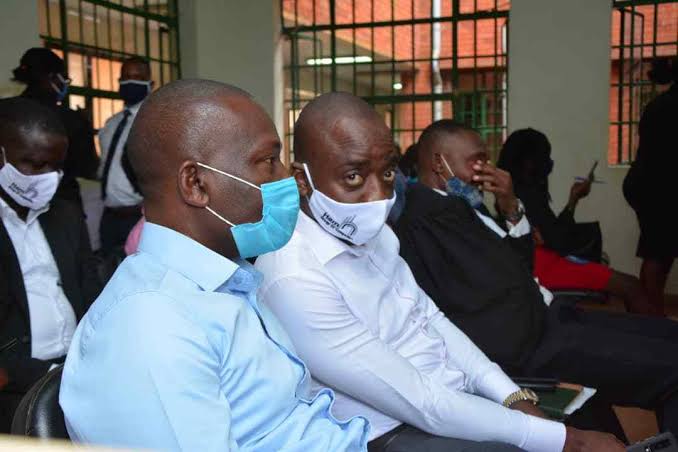KAMPALA: On Wednesday last week, Court of Appeal ruled that a Kampala businessman, Hamis Kiggundu (Ham) was wrongly awarded the UGX 120 billion compensation by the Commercial court last year.
In a unanimous decision of justices Kenneth Kakuru, Christopher Madrama and the DCJ Richard Buteera, the case file involving Hamis Kiggundu and Diamond Trust Bank has been sent back to the Commercial Court for a retrial after establishing that the Highcourt judge Henry Peter Adonyo did not address himself on the merits of the case before deciding it on a point of law.
On the issue of illegality of Diamond Trust Bank (K) Ltd conduct of financial institutions business in Uganda without a license, they (Justices of the Court of Appeal) faulted Commercial Court Judge, Henry Peter Adonyo of having erred when he ruled that DTBK required approval from Bank of Uganda to issue credit facilities from Kenya to Ugandan entities.
They stated that the learned trial judge erred in law in finding that it is illegal for a foreign bank using ‘money held on deposit’ whether within Uganda and or outside it to engage in activities, such as lending and extending credit facilities to Ugandan entities without authorization of Bank of Uganda.
It Should be remembered that Ham through his lawyers had diverted from the main case of the ‘deductions claim’ and focused on the ‘illegality’ of DTBK doing business in Uganda.
Therefore by quashing the illegality narrative and sending the case back to Commercial Division of the High Court for retrial, it meant that Mr Ham Kiggundu’s claim that DTB Uganda and DTB Kenya deducted huge sums of money in excess from his accounts must be resurrected and heard as the main case.
This will automatically call for an independent audit into the financial transactions between Ham and DTB, an exercise Ham through his lawyers had rejected earlier.
But DTB says it’s ready for an Independent audit if Court sanctions it to determine who owes who money.
However, Hamis Kiggundu has in the wake of Wednesday’s Court of Appeal judgment quashing the Commercial Court’s ruling in the multi-billion lawsuit against Diamond Trust Bank (DTB) Uganda and Kenya, announced that he will appeal to the Supreme Court, an act seen by DTB lawyers as delaying tactics to avoid hearing of the main suit in Commercial Court as directed by the Court of appeal.
Genesis of the Ham Kiggundu-DTB case
Last year in August, the financial sector was hit by shock waves following Hamis Kiggundu’s decision to petition court on the claim that Shs 85bn and Shs34 bn were deducted by DTB Uganda and DTB Kenya from two accounts of his companies, Ham Enterprises and Kiggs International Uganda Limited, “without his knowledge and consent.”
Court records show that between 2011 and 2016, Kiggundu through the two companies acquired loans totaling to Shs41bn from DTB Uganda and DTB Kenya to boost his real estate businesses on condition that he mortgage his properties in Makerere Hill, Kawuku, Kyadondo and Victoria Crescent Road among other plots of land.
However, in 2019 the banks reportedly served him with documents indicating that he had not met his loan obligation worth Shs 39bn as per their agreement. The banks threatened to attach his properties he had mortgaged.
Kiggundu ran to court arguing that the money that was withdrawn from his dollar and shillings accounts was excess yet he had also fully paid the loan. Kigundu accused Diamond Trust Bank (U) Ltd and Diamond Trust Bank (K) Ltd of unjustly and illegally debiting his bank accounts.
On Aug. 31, Justice Adonyo directed the Institution of Certified Public Accountants of Uganda to appoint an independent auditor to carry out account reconciliation of the financial transactions which were based on the credit facilities between Ham Enterprises and DTB.
However, Kiggundu’s lawyers asked the court to halt the auditing process pending the determination of another application, where Kiggundu raised questions of the illegality of Diamond Trust Bank (K) Ltd conduct of financial institutions business in Uganda without a license to do so under the Financial Institutions Act, 2004 (as amended).
Interestingly, through his lawyers, Muwema and Company Advocates, Kiggundu asked the court to declare that all the loans he obtained have since been paid and also issue an order of refund of the money obtained illegally in the aftermath.
The banks argued that Mr Kiggundu and his two companies held accounts with them and on various dates borrowed $6.7m (about Shs24b), Shs1.5b, Shs1b, $4m (Shs14b) and $500,000 (Shs1.8b). They also argued that DTB Uganda acted lawfully and that it was not an agent for its Kenyan counterpart.
Non-performing credit
DTBK and DTBU contended that the credit facilities became non-performing with an outstanding liability of more than $10 million.
This non-performance moved the banks to make deductions on account of interest and other charges from Ham’s accounts in accordance with the relevant loan agreements.
However, Ham disputed DTB’s loan claims arguing that he had settled all debt obligations and was in fact owed $23m (Shs85.8b) on account of the unlawful deductions by the banks.
Adonyo’s reckless ruling
Justice Peter Adonyo awarded Ham $23m and Shs34.2b and deemed the alleged loan transaction illegal as DTB Kenya failed to produce a licence allowing it to conduct financial institutions business in Uganda from Bank of Uganda.
The justice also declared that the appointment of DTB Uganda by DTB Kenya, as an agent bank and security agent in respect of the the latter’s loan was illegal, and in breach of fiduciary duty and the Financial Institutions Act 2004 (As Amended) as well as the Bank of Uganda Consumer Protection Guidelines 2011 and the Kenyan Banking Act.
Kiggundu wanted to be paid Shs120 billion unfairly after he did his own private audit of the bank accounts but interestingly, the independent audit agreed on by the two sides was ignored by Judge Adonyo even though he had earlier okayed it. It surprised many legal professionals in Uganda.
Following the ruling, Kiggundu the proprietor of Ham Enterprises and Kiggs International Limited, would go into early celebrations, but the celebrations were cut short by Dr. Zeija, giving a leeway for DTB-Uganda to appeal against the high court ruling that was castigated by many players in the business community as well as the general public.
Court of Appeal
The banks appealed the decision in the Court of Appeal.
After conclusively hearing the appeal, Justices Richard Buteera, Kenneth Kakuru and Christopher Madrama ruled that Justice Adonyo had erred in law when he faulted the lending arrangement and allowed Mr Kiggundu’s firms to recover Shs34b and $23.2m (about Shs84b) from them.
“I know of no law that makes it illegal for a Ugandan citizen or a foreigner resident in Uganda to borrow or pay back money borrowed from a foreigner or a foreign institution, bank or any other organisation unless the transaction involves the perpetuation of a criminal offence such as terrorism, money laundering and human trafficking or any other offence,” justice Buteera ruled further adding that “A loan agreement with a foreigner or foreign entity whether the contract is executed within Uganda or outside Uganda would be enforced by a Ugandan court in accordance with the terms of the agreement between the parties, the laws of the respective countries in which the agreement is made and or is executed and International Laws and obligations as applicable in the respective countries.”
He concluded by saying that since his colleagues agree, “this appeal succeeds. The judgement of the trial judge is set aside. The respondents are to bear the costs of this appeal.” Deputy Chief Justice Buteera ruled.
“An order is granted remitting the suit back to the Commercial Division of the High Court to be expeditiously fixed and heard by another judge,” ruled Justice Butera.


